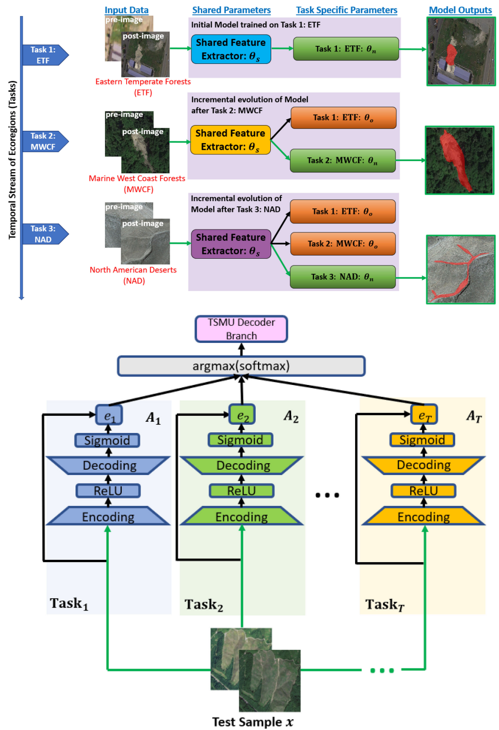-
Sep 2023 - Present
Research Assistant
The Pennsylvania State University
State College, PA
Intelligent Prompting of Large-Scale Vision Models: Developing a few-shot prompt generator for leveraging Meta AI’s Segment Anything Model (SAM)’s zero-shot segmentation capabilities for downstream tasks such as co-saliency detection, semantic, instance, and video segmentation, and tracking.
-
May 2021 - Aug 2023
Research Assistant
The Pennsylvania State University
State College, PA
Segmentaion Refinement: Developed a lightweight post-processing segmentation refinement network that refines the raw logit maps from any base segmentation network, consistently improving the segmentation performance by 2-3% (WACV 2024).
May 2021 - Aug 2023
Research Assistant
-
Aug 2019 - May 2021
Research Assistant
The Pennsylvania State University
State College, PA
Automated Segmentation of Global Landslide Events: Developed a SOTA deep continual learning framework in collaboration with Google AI and USGS for automated segmentation of global landslide events from satellite imagery, showing a 14% improvement in performance compared to existing models (IEEE JSTARS 2022). Featured and presented our work at the Google AI Summit, 2020, and American Geophysical Union TV.
-
May 2023 - Aug 2013
Research Intern
Schlumberger Doll Research
Cambridge, MA
Internship 3: Developed a zero-shot, domain-agnostic, interactive framework for high-quality automated region extraction from satellite imagery, showing SOTA performance when compared to supervised segmentation models (patent filed).
May 2023 - Aug 2023
Research Intern
-
Apr 2021 - Aug 2021
Research Intern
Schlumberger Doll Research
Cambridge, MA
Internship 2: Developed a 3D semantic inpainting deep learning framework using MoCoGan to generate high-quality, realistic 3D videos of reservoir sedimentation, conditioned on provided well-log data with 100x improvement in FPS compared to expensive simulators (EAGE 2022).
-
May 2018 - Aug 2018
Research Intern
Schlumberger Doll Research
Cambridge, MA
Internship 1: Designed a rapid, scalable, and search-efficient deep reinforcement learning framework to learn an optimal policy for valve settings of multi-lateral oil wells to maximize the Net Present Value (NPV) (patent filed).
May 2018 - Aug 2018
Research Intern
-
Apr 2018 - May 2019
Research Assistant
The Pennsylvania State University
State College, PA
Developed an end-to-end deep learning framework to transform kinematics (video of human action) to dynamics (foot pressure heat map) in order to extract the trajectory of the center of pressure for human gait stability analysis. (ECCV 2020)
-
May 2016 - Aug 2016
Research Intern
University of Southern California
Los Angeles, CA
Designed a framework for jerk-less point-to-point trajectory planning with dynamic obstacle avoidance for humanoid end-effectors.
May 2016 - Aug 2016
Research Intern
 Recent Highlights
Recent Highlights about me
about me




 skills
skills experience
experience education
education Get In Touch
Get In Touch